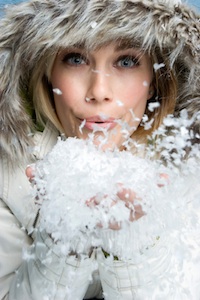Makeup
Expert Q&A: Your Top 5 Winter Skin Questions Answered
Posted 12/03/10 at 10:04AM by Audrey Fine
 Sleigh bells and snowballs and mugs of good cheer are all fun things about winter -- the dry, cracked, often painful skin issues that come with it, are not.
Sleigh bells and snowballs and mugs of good cheer are all fun things about winter -- the dry, cracked, often painful skin issues that come with it, are not.What's a girl to do when simply moisturizing no longer cures what ails you? Why, consult an expert of course. What? You don't happen to have one at your beck and call? Relax. We do. And, as an early holiday gift, we asked Dr. Anne Chapas, a board certified dermatologist who practices at the distinguished Laser & Skin Surgery Center of New York, to address five of your most pressing cold weather skin concerns.
Here's what the wise doctor has to say. (She graduated cum laude from Harvard Medical School, so listen up, she knows her stuff.)
Question: "It's gotten cold here in DC and all of a sudden my cheeks are super dry and flaking. Foundation powder looks horrid! I moisturize at night and in the morning with my regular product but it's not healing it. Should I switch moisturizers for winter?" -- Ayanna F
Answer: "Absolutely. I have my patients switch from lotion and gels to heavier creams and even ointments in the winter. It's also important to exfoliate the flaky skin several times a week in addition to using moisturizer twice a day. For really dry and irritated skin, I've started prescribing EpiCeram cream to help rebuild the skin's outer layers." Dr. Chapas says that you can also look for an over-the-counter cream containing ceramides, hyaluronic acid and niacinamide to work "along the same principles."
Question: "I get these little tiny bumps on the backs of my thighs that get so itchy at night and it drives me crazy! I even use organic soap and lotions every day! What else can I do?" -- Beth H-G
Answer: "That dreaded winter itch that is sometimes associated with irritations of the hair follicles on the backs of the legs. First, change to a fragrance-free soap and always make sure that you apply moisturizer within three minutes after showering while your skin is still moist." If that doesn't help, Dr. Chapas recommends using an over-the-counter hydrocortisone cream on the area twice a day until the itching subsides.
Question: "My knuckles crack and bleed every winter when the air gets cold and dry. I'm a healthcare worker and wash my hands [often] and this makes it worse. Another problem is that I can't stand the greasy feel of thick lotions, and they also leave grease spots on any notes I write, so I need a lotion that works well but that will also soak in instead of sitting on top of my skin." -- Denise C.
Answer: "The first step is to stop washing your hands with soap and to start using antibacterial liquid. Frequent hand washing can dry the skin and makes it more prone to irritation. Lotions containing dimethicone are rapidly absorbed into the skin, but you must use greasy ointments containing petrolatum, panthenol and glycerin at night. For really severe dryness, I recommend wearing cotton gloves over the ointment to increase its penetration into the skin."
Question: "What's the best facial cleanser for very dry, very sensitive flakey skin that's mostly on my forehead? It seems like I've tried everything and either I have a reaction to it or my skin flakes out." -- Angela B.
Answer: "Dry, flaky skin on the forehead is usually not dry skin and more likely a skin disease known as seborrhea dermatitis. Seborrhea dermatitis is caused by the body's reaction to yeasts that naturally live in the skin and is best treated with dandruff shampoo or anti-fungal creams. I would recommend first using a dandruff shampoo in the shower twice a week [leave it on your scalp] for five minutes, making sure to [also] treat your forehead. If this doesn't improve, see your dermatologist for a prescription cream."
Question: "Every winter my hands turn bright red and are hot to the touch. Also, a little itchy. What gives?" -- Heidi W-D.
Answer: "Red hands, especially in the winter, could be sign of a blood flow problem in the hands, which is sometimes seen in normal, healthy people, and other times is associated with auto-immune conditions. I would discuss this with your primary care physician."

By submitting your e-mail address you agree to our privacy policy & terms & conditions
Add us to your safe send list so our newsletters arrive in your inbox. How do I do this?
Our Expert Guides
-
Rebekah
GeorgeHost
-
James
CorbettHair colorist
-
Michael
DueñasHairstylist
-
Brooke
MarroneFitness
-
Sage
MaitriMakeup
-
Dr. Kavita
MariwallaDermatology






















Nice advice
Report Abuse
Interesting--I've never heard of EpiCeram and I have eczema.
Report Abuse
Some food for thought...
Report Abuse
I wouldn't use the antibacterial soap either. I'm a healthcare worker too and the lotion I found that works the best no matter how many times I wash my hands is made by a small company called L'Bri. Their lotion has really helped to heal my hands.
Report Abuse
No, antibacterial soap is NOT the answer. Usually, antibac soap is MORE drying, AND it contributes to bacterial resistance. Soap and water will get your hands perfectly clean, and it's LESS drying. Putting on lotion or greasy creams RIGHT AFTER you wash your hands or shower is key to actually keeping moisture IN.
Report Abuse
Thanks for the info (even though I do question some of it).
Report Abuse